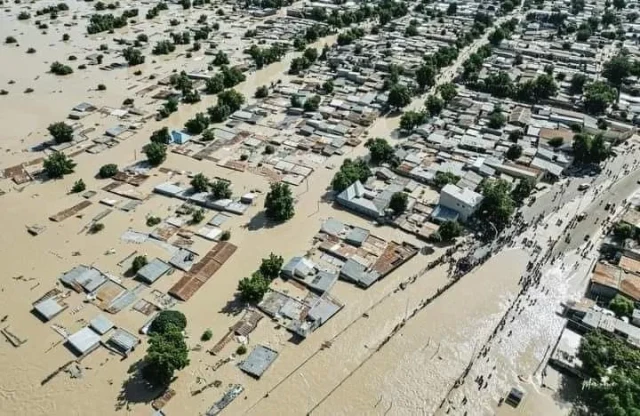The Renevlyn Development Initiative (RDI) has attributed the collapse of the Alau Dam in Borno State and the flooding of farmlands and hundreds of homes in Maiduguri, the state capital, to a complete lack of coordination among the government's emergency response agencies at the federal and state levels.
The RDI position, contained in a statement issued in Lagos on Wednesday, September 11, 2024, comes on the heels of the collapse of the dam on Tuesday, September 10, and inundation of 70 per cent of Maiduguri.
The flooding of the communities was said to have begun about a week ago but reached its peak in the early hours of Tuesday, displacing residents of Fori, Galtimari, Gwange, Bulabulin, and other communities.
In the aftermath of the incident, thousands of homes have been submerged, including the palace of the Shehu of Borno and government facilities in the capital.
There has also been a jail break and escape of animals in the Museum Park, further endangering hapless residents.
Reports indicate that 80 per cent of animals at the Sanda Kyarimi Park Zoo died because of the incident.
In a statement issued in Lagos, RDI said the collapse of the dam was completely avoidable, adding that the incident represents failure in governance at all levels since the floods had hitherto been predicted by the Nigeria Meteorological Agency (NiMet) and the Nigeria Hydrological Services Agency (NIHSA) yet no concrete pre-emptive actions or flood management plan was put in place to safeguard lives and property.
Executive Director of RDI, Philip Jakpor, said: “Maiduguri may just be the starting point. We had warned several times that the lacklustre approach of the federal and the state governments that have collected about N40 billion in Ecological Funds this year alone to addressing perennial floods would lead to avoidable catastrophic incidents like this.
"Perhaps the attention that has attended this case is only because Maiduguri the state capital is involved. If it had been in the remote communities, there would be less alarm. This is completely damning for the government.”
Jakpor maintained that a dam does not just collapse in a day without notice.
“With the intense rains a proactive management would have known that waters must be released gradually from the dam to avoid a breach. But, in this case, the waters had reached the crescendo before the management of the dam raised the alarm.”
The RDI boss pointed out that someone or some people must be held to account for the failure in acting to prevent the collapse of the dam and the monumental losses that the state has recorded and would incur in the days ahead.
He pointed out that Nigerians had yet to see effective and proactive coordination between the National Emergency Management Agency (NEMA) and their state counterparts in response to flooding incidents.
“Unfortunately, what we only read is how the emergency management agencies struggle to share palliatives when such disasters would have been prevented in the first place,” he said.
He urged other states of the federation to take a cue from the incident and take proactive measures to avoid similar happening, going further to alert that, in the Niger Delta region for instance, monster floods are predicted to happen.
“The Alau Dam collapse is a tragedy that could have been avoided. Until we take pre-emptive measures to address the fallouts of climate change, we will only continue suffering economic losses and needless loss of lives,” Jakpor stated.




















